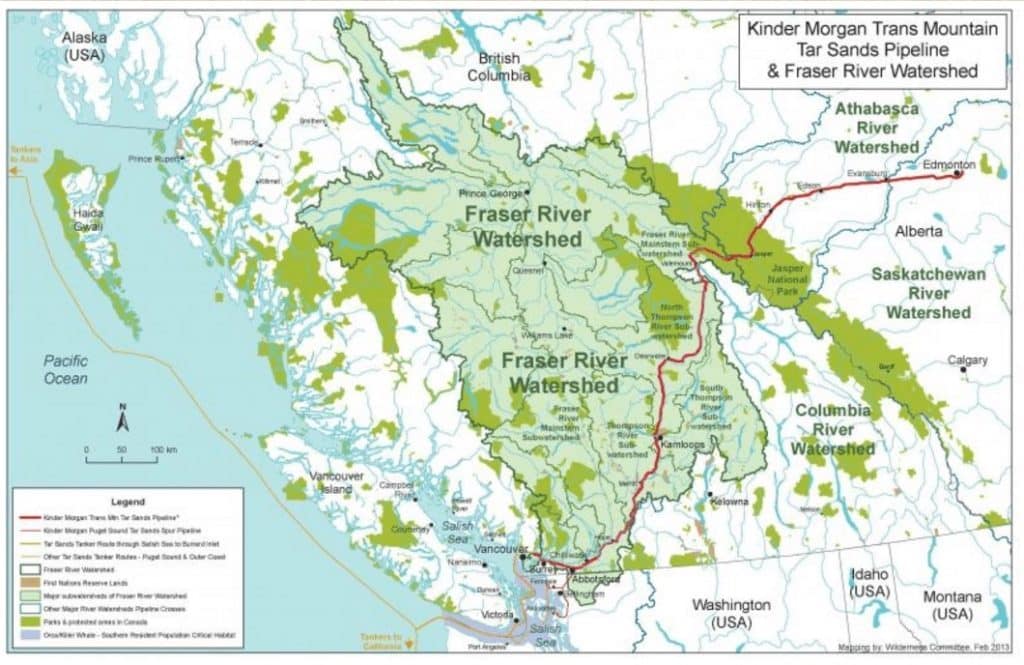
On May 9th we have the chance to vote for real climate leadership by using our votes to elect a government that will stop the proposed Trans Mountain pipeline.
What price would you put on leadership that understands how the Trans Mountain pipeline is connected to climate change? What does a pipeline have to do with the price of a loaf of bread? What could possibly be more important than food and water?
We Need Climate Leadership
Water shortages and the impacts of drought and floods are already being felt nationwide. These issues not only impact individual communities but, in an interconnected global age, the impacts to a region’s agricultural production can affect prices worldwide. This is compounded by the many different places facing similar agricultural challenges at the same time.
The tragic circumstances that led to the mass migration of Syrian refugees were, at least in part, the result of climate change affecting food and water supplies.
And yet, this threat, the single biggest threat facing humanity today is something that our leaders feel can be ignored when it comes to building pipelines and burning fossil fuels.
What does Trans Mountain have to do with Climate Change?
When looking at the true costs of the Trans Mountain pipeline, there is a significant risk around climate change that comes from developing one of the most carbon-intensive sources of energy in the world; the Tar Sands.
- The Tar Sands are estimated to contain enough carbon to increase the current level of greenhouse gasses in the atmosphere by more than half.
- They are the fastest growing source of emissions in Canada.
- Developing the Tar Sands renders pointless all other efforts to reduce greenhouse gas emissions.
- The main justification for the expansion of the Trans Mountain pipeline is to expand and exploit the Tar Sands in perpetuity.
Kinder Morgan 101
Houston-based Kinder Morgan (formerly Enron Liquid Pipelines) is one of the largest fossil fuel companies in the world.
The company intends to build a new 1,100 km export pipeline for a dangerous kind of oil called diluted bitumen. The route would be carved out from Northern Alberta to Vancouver’s Burrard Inlet. It culminates at the ocean where massive tankers will transport the oil across the world.

Source: Wilderness Committee
The proposed pipeline would increase the amount of hazardous crude oil traveling through British Columbia’s water more than seven times: from approximately 60 tankers a year to over 400.
What Does Our Future Look Like if the Proposed Trans Mountain Pipeline Is Built?
Building the Trans Mountain pipeline not only commits BC’s west coast to a specific economic development path; it also jeopardizes our international and national climate commitments and puts our planet at an even greater risk than it sits at already. The only way that this pipeline can be built is if Canada intends to abandon its commitments to cut CO2 by allowing new and additional expansions of the tar sands well into the next decade.
NASA climate scientist James Hanson has estimated that there are 250 gigatons of carbon locked in the tar sands – almost half of the entire global emissions budget.
Building the pipeline based on the assumption that we will “remain substantially dependent on carbon fuels for the next several decades” is condemning us to a fate worse than any humanity has ever known.
What Does Climate Change Look Like Today?
We already face:
- Rising sea levels that are having an increasingly extreme effect on coastal communities.
- King tides along with strong storm surges have caused flooding around the world including here in BC.
- A reduction in soil quality and viable farmland worldwide
- Both droughts and record rainfalls are degrading soil and leading to food shortages. California, Texas, and Alberta are just a few of the places that have had major incidents of both extremes that have led a loss of crops and livestock and sharp price increases for consumers.
- An ever-increasing number of extreme weather events and heat waves
- Thousands have died in Europe, Russia, India and Pakistan as temperatures surge. Tsunamis, cyclones, and hurricanes with increased strength have devastated the Philippines, Thailand, the Caribbean and the eastern US.
- Vast forest fires
- Extreme heat, droughts, and evolution of the pine beetle have made devastating forest fires, especially in BC, the norm rather than the unusual. The ecological and economic cost has been staggering.
- Species extinction
- Many species including Cod, Penguins, Narwhals, Asian and African Elephants, Snow Leopards, Polar Bears and Monarch butterflies are at immediate risk of extinction and as the ocean warms, water becomes scarcer and the seasons continue to change, many others will follow
- Ocean acidification.
- We rely on the ocean for food, recreation, transportation, and medicine. At least one-quarter of the carbon dioxide (CO2) released by burning oil and gas doesn’t stay in the air but instead dissolves into the ocean making it more and more acidic. Ocean acidification is already dissolving the shells of many shellfish and destroying the coral reefs around the world.
- Beyond lost biodiversity, acidification is affecting fisheries and aquaculture, threatening food security for millions of people, as well as tourism and other sea-related economies.
- Disease
- Warming temperatures are causing many tropical diseases such a the Zika Virus, Dengue Fever and Malaria to move into areas that were once immune to them.
- Increasing world security issues and climate migration
- Civil unrest caused by population migration in search of food and water in areas like Syria hit by drought and floods
On May 9th, vote for a climate leadership, and not the Trans Mountain pipeline.
How Can I Vote For Climate Leadership – Not a Pipeline?
What Else Can I Do to Help?
Spread the Word
When people see other people they know or can relate to expressing their views, it can make a big difference.
Sign up to Become a Friend of the Sacred Trust
Become a Friend of the Sacred Trust
Stay informed about the Trans Mountain pipeline proposal and don’t miss important updates from the Sacred Trust team.



